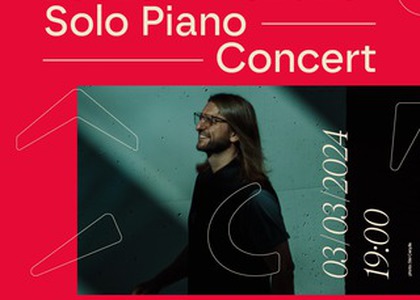> [Archived] Events

Reportage with Leszek Mo¿d¿er
Memorable concert by the Polish pianist Leszek Mo¿d¿er last Sunday, at the Romanian Athenaeum. The famous jazzman started the Cultural Season Romania-Poland 2024-2025 through a recital. On this occasion, Leszek Mo¿d¿er was interviewed by Radio România Muzical, which we can see in the reportage made by Viorel Grecu at the Athenaeum.
Leszek Mo¿d¿er captivated the audience at the Athenaeum from the very beginning. The pianist performed his own works and a few interesting remakes after Chopin, Jean-Michel Jarre, Lars Danielsson, Krzystof Komeda or Astor Piazzolla. The Polish musician impressed by his technical austerity and complexity of sound, but in his case, these are first of all some methods for transmitting strong emotions. Leszek Mo¿d¿er's sincerity and warmth elicited a corresponding reaction from the audience. After the concert we asked a part of the audience for a few impressions. Bogdan Mateescu, IT engineer, is a big fan of the Polish pianist:
"An absolutely amazing concert, there could not have been a better choice for this event. The fact that he chose to reperform his Garana concert from last year filled me with so much joy. Although, in this amazing hall, he sounded better. The guys is absolutely phenomenal and this concert really touched me. Actually, each time I had the opportunity to listen to him live did so.
Did you see him multiple times?
Yes, the first time was in 2012."
Unlike Bogdan, it was the first time seeing Leszek Mo¿d¿er for Silvia and Andrei:
"It was very nice. We like it a lot. It was really touching towards the end. We were not familiar with his works, but he was impressing and the connection between Romania and Poland was perfect for his presence here tonight."
After he gave autographs, we had the pleaser to interview the pianist Leszek Mo¿d¿er, who also impressed by the concert he just ended at the Romanian Athenaeum.
I saw an interview on YouTube where you said that you do not sing alone at your concerts, but that you do along with the audience. Was it the same tonight?
Tonight, the audience was exceptional, electric even. I felt the air charged with electricity, the people were really eager to heart the music. It was a breath-taking experience for me. I was really inspired because I had a lot of support from the audience. I felt a lot of curiosity, love, it really helped me. The audience was amazing, it was one of my best concerts regarding the energy. I don't remember to have had such an atmosphere in years. It was really special, a unique experience tonight.
Did you like the hall at the Athenaeum?
This hall is majestic, uplifting. It was a literal honour, a big pleasure, it was so special to me to be able to perform in such a place.
Polish jazz has an interesting tradition. So does classical music. What was it like for you to grow up as a young musician in such a fantastic culture?
When I started studying jazz in the '90s, there were not many jazzmen, you could count the bassists on one hand in my town. Besides the big musicians such as Tomasz Stañko, Zbigniew Namys³owski, Janusz Muniak, Micha³ Urbaniak and others, there were not actually that many jazzmen in the provincial towns. I was lucky to sing with Stanko, Namys³owski, with the best musicians alive at that point in time. Now Poland has changed a lot, there are hundreds, even thousands of great musicians, which causes new problems: how to become your true self, how to have a unique voice compared to this many people. So it is a different era for the Polish jazz.
Your albums are really successful in the Polish charts, and this is a rarity for a jazz musician anywhere in the world. How do you explain this huge popularity in your native country?
It was a combination of many things. First of all, I worked really hard, for many years I had 4-5 concerts a week. When I released my first album, the audience was ready, they already knew me, even though I performed in clubs. Then I was lucky to know people who would be able to promote me thoroughly. One of the first albums, Piano, was successful because the producer bought every newspaper from the kiosk and attached a CD to each of them. Then he called and talked his way through with every journalist from cultural newsrooms to write some reviews. After that, each one of my albums became visible, the producers already knew that they would make profits, they had faith in me because I proved that my solo piano albums can sell really good in music shops.
Do you have any new projects, any new recordings in progress? What can you tell us at this moment in time?
I have just finished an album with Adam Baldych, an extraordinary Polish violinist. The album is called Passacaglia and it was on ACT Music, in Germany. It's interesting because I used two tunings and two pianos, at 442 and 440 hertz. I performed a few songs on both of them, with this parallel reality of the tunings, so it's something fresh. And now I have just finished recording for a new album as a trio, with Mozdzer, Danielsson and Fresco. Lars Danielsson is a Swedish bassist, and Zohar Fresco is and Israeli percussion player. I went even farther because I have three pianos with three different tunings. One of them is dodecaphonic, so there are ten musical notes in an octave, rather than 12. I combine these systems and I think that it is going to be an interesting album with Mozdzer, Danielsson and Fresco for the music lovers.
Translated by Cristina-Paula Grosu,
University of Bucharest, Faculty of Foreign Languages and Literatures, MTTLC, year I
Corrected by Silvia Petrescu














